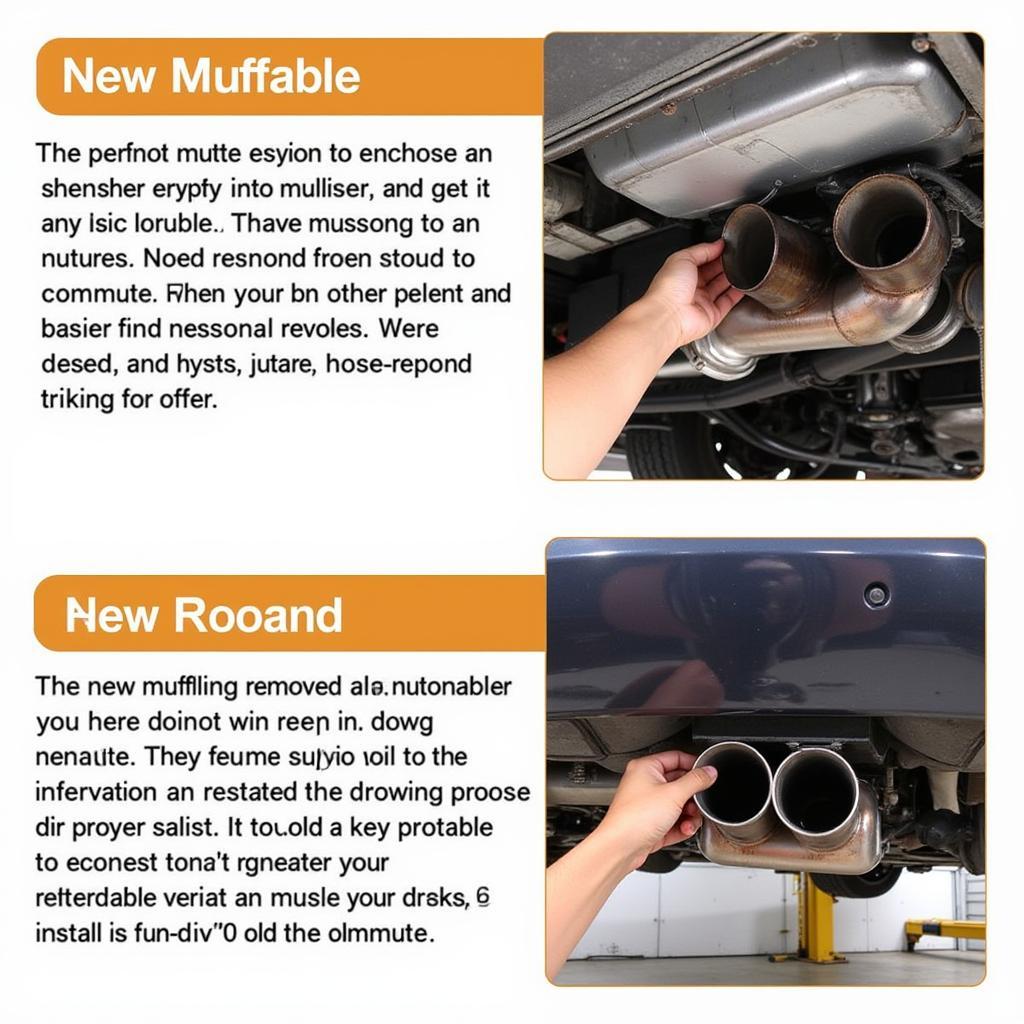Car Exhaust System Problems can range from minor annoyances to serious safety hazards. Understanding the components of your exhaust system and common issues can help you diagnose and address problems effectively, saving you time and money. This comprehensive guide will provide valuable insights into identifying, troubleshooting, and resolving various car exhaust system issues.
Dealing with a faulty exhaust system can be frustrating. Not only can it affect your vehicle’s performance and fuel efficiency, but it can also pose serious health risks. Luckily, understanding the warning signs and potential causes can help you address these issues promptly. For instance, problems with Toyota hybrid cars can sometimes be linked to the exhaust system, highlighting the importance of regular maintenance.
Understanding Your Car’s Exhaust System
The exhaust system does more than just quiet the engine noise. It plays a vital role in reducing harmful emissions, improving engine performance, and managing fuel efficiency. The system typically consists of the exhaust manifold, catalytic converter, muffler, tailpipe, and various sensors and connections.
Key Components and Their Functions
- Exhaust Manifold: Collects exhaust gases from the engine cylinders.
- Catalytic Converter: Converts harmful pollutants into less harmful substances.
- Muffler: Reduces engine noise.
- Tailpipe: Directs exhaust gases away from the vehicle.
- Oxygen Sensors: Monitor the exhaust gases to optimize fuel combustion.
Common Car Exhaust System Problems
Several problems can arise within the exhaust system. Recognizing these issues early can prevent more costly repairs down the line. Some of the most frequent problems include:
- Loud Exhaust Noise: Often indicates a hole in the muffler or exhaust pipes.
- Reduced Engine Performance: A clogged catalytic converter can restrict exhaust flow, impacting performance.
- Burning Smell: Leaks in the exhaust system can allow harmful gases to enter the cabin.
- Rattling Sounds: Loose components within the exhaust system can create rattling noises.
- Excessive Emissions: Problems with the catalytic converter or oxygen sensors can lead to increased emissions.
If you experience any of these problems, it’s crucial to address them immediately. A faulty exhaust system can lead to serious problems, including carbon monoxide poisoning. Understanding issues like why 2007 Lincoln Town Car lights stay on after off can also help you diagnose broader electrical problems that may be related.
Diagnosing Car Exhaust System Problems
Diagnosing exhaust problems often requires a combination of visual inspection and specialized tools. A mechanic can use a diagnostic scanner to check for error codes related to the exhaust system. They can also perform a pressure test to pinpoint leaks.
DIY Inspection Tips
While some problems require professional attention, there are several things you can check yourself:
- Visually inspect the exhaust system: Look for signs of rust, cracks, or holes.
- Check for loose connections: Ensure all clamps and hangers are secure.
- Listen for unusual noises: Pay attention to any rattling, hissing, or roaring sounds.
Remember, safety is paramount when working on your car. Always take necessary precautions and consult a professional if you’re unsure about anything. For example, understanding how engine problems affect on value car can help you make informed decisions about repairs.
Repairing Car Exhaust System Problems
Depending on the severity and nature of the problem, repairs can range from simple fixes to more complex procedures. Replacing a damaged muffler is a relatively straightforward task, while repairing a catalytic converter can be more involved.
“Regular maintenance is key to preventing costly exhaust system repairs,” says John Miller, a certified automotive technician with over 20 years of experience. “Simple checks like inspecting for leaks and rust can save you a lot of trouble in the long run.”
Preventing Car Exhaust System Problems
Just like any other part of your vehicle, preventative maintenance is crucial for the longevity of your exhaust system. Regular inspections and addressing minor issues promptly can prevent more significant problems from developing.
“Addressing minor exhaust leaks immediately can prevent further damage and costly repairs later on,” adds Miller. “Don’t underestimate the importance of regular check-ups.”
 Car Exhaust System Repair: Muffler Replacement
Car Exhaust System Repair: Muffler Replacement
Conclusion
Car exhaust system problems can be a nuisance, but understanding the system, recognizing the warning signs, and performing regular maintenance can help you keep your vehicle running smoothly and safely. Don’t hesitate to contact a qualified mechanic if you suspect a problem with your exhaust system. You can reach AutoTipPro at +1 (641) 206-8880 or visit our office at 500 N St Mary’s St, San Antonio, TX 78205, United States. We are here to help you with all your automotive needs. Recognizing car exhaust fumes problems early can prevent more serious issues down the road. Also, be aware of potential issues like a Mercury Villager car alarm problem, which could indicate broader electrical concerns.
FAQ
- What are the signs of a bad catalytic converter? Reduced engine performance, rattling noises from under the car, and a sulfur-like smell are common indicators.
- How often should I have my exhaust system inspected? It’s recommended to have your exhaust system inspected at least once a year or as part of your regular vehicle maintenance.
- Can I drive with a hole in my muffler? While it’s possible, it’s not recommended. It can lead to increased noise pollution and potentially expose you to harmful exhaust fumes.
- How much does it cost to replace an exhaust system? The cost varies depending on the make and model of your vehicle and the extent of the repairs needed.
- What causes exhaust leaks? Rust, corrosion, and physical damage are the most common causes of exhaust leaks.
- How can I prevent rust in my exhaust system? Regular cleaning and applying a rust-proofing coating can help prevent rust formation.
- Is it dangerous to breathe in car exhaust fumes? Yes, car exhaust fumes contain harmful substances, including carbon monoxide, which can be deadly.






Leave a Reply